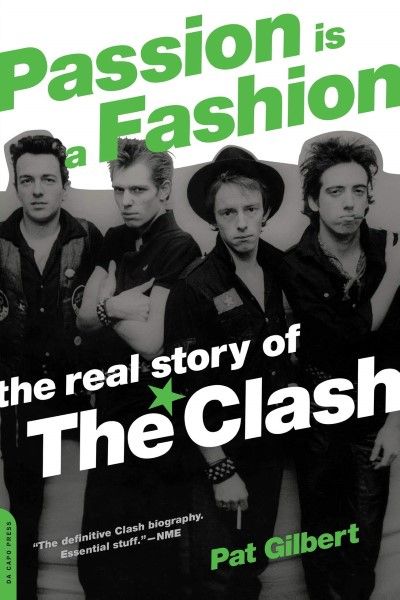27 August, 2007
Review: Passion is a Fashion: The Real Story of The Clash by Pat Gilbert
Rock bios are a hit or miss affair. Sometimes they're hastily published to capitalize on the new-found success of a band or musician and contain little substance. However, books about established artists can be equally as worthless. All too often such texts are strict chronological records which never try to justify their existence by telling the reader why the artist being profiled is important. I've long admired Dave Marsh's account of The Who in his Before I Get Old. He imposed a narrative on the events he chronicled and cast Pete Townshend as the hero with Keith Moon as his foil. Whatever you may think of Marsh's tale, he constructed a nimble tale which was also an argument for the importance of The Who and their legacy which makes for much more interesting reading than "first this happened and then that and then something else".
As a former editor at the English music magazine, MOJO, Pat Gilbert has the credentials to write a rock bio. This, combined with his unabashed love of The Clash, gives the reader every expectation that Passion is a Fashion will be a great read and Gilbert delivers. He makes a critical and nuanced case for The Clash as a very important band in the rock pantheon. In addition, Gilbert uses his story to examine rock music as populist art and art as commerce.
The late Joe Strummer is clearly the hero here as his background is the subject of the book's first chapter, though those of Mick Jones and Paul Simonon subsequently follow. Strummer is portrayed as a troubled genius who, through fits and starts, finally finds his identity and voice in The Clash. In fact, the book links the formative years of all the band's members to their days as rock stars. Being an American, some of Gilbert's slang and English cultural and place references went over my head, but he did a good job of explaining the malaise of mid-1970s England which gave birth to the punk movement. With a mission statement of "We're anti-Fascist, anti-violence, we're anti-racist, and we're pro-creative", the band's eponymous debut arrived in the spring of 1977. Besides being a seminal punk album, it also contained the seed of what would give The Clash their legacy and make them important: a cover of the reggae song "Police and Thieves" which was an international hit in 1976 for Junior Murvin.
The book patiently shows how this first murmur of combining rock with reggae led to further cross-breeding with dub and eventually saw the band perform and record with Jamaican reggae/dub artist Mikey Dread. When The Clash went to New York City, they picked up on rap and incorporated it into their sound. Gilbert points out that this ability to infuse the music of disaffected minorities, of the street, with rock'n'roll was their greatest asset. It may have led them away from punk, but it also allowed them to transcend it as well and become something other than a short-lived burst of anger and nihilism like their contemporaries, the Sex Pistols. And it is this legacy, as Gilbert asserts, which countless musicians have picked up on over the years.
While the author is clearly enamored of his subject, he gives criticism when it's due. For instance, he exposes the hypocrisy of the band and their anti-violence stance by recounting several instances of band members getting into brawls both onstage and off. And Gilbert's case for The Clash as musical innovators isn't damped by his acknowledgment that they recorded some real duds in their time. Plus he notes how the callousness of the band as they publicly denounced members of its entourage who were expelled.
Just as with The Who in Before I Get Old, the idealism of The Clash runs headlong into commercialism and the Big Bad Record Company. While it's not fair to place all the blame at the doorstep of CBS Records, the absolutely ridiculous contract they had with the band created lots of friction. Living up to all of one's ideals is difficult with a record company on your back demanding product and bills to be paid. But unlike his fellow writer, Gilbert sees the story of The Clash through to the bitter end. Marsh declared The Who dead in 1978 when Keith Moon died and paid only lip service to the following four years. Gilbert, on the other hand, retains his level of analysis in detailing the last couple years of The Clash's existence after Mick Jones and Topper Headon were gone. Those days were not pretty but they're part of the story.
That fans of The Clash will enjoy Passion is a Fashion is a no-brainer. But even I as a less than die-hard enthusiast of the band found it to be a great read and so will anyone who is passionate about rock music. This is because the book is about more than chronicling the nine or so years of The Clash's existence. It's a great tribute to the malleability of rock music which makes it so powerful to musicians and fans alike. In its page is also a look at the intersection of art and commerce as well as a more personal tale about imperfect people who were never quite able to live up to their ideals.
Subscribe to:
Post Comments (Atom)

No comments:
Post a Comment